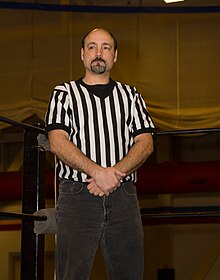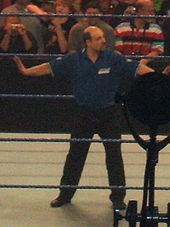Jimmy Korderas
| Jim Korderas | |
|---|---|
 Korderas at an independent wrestling show in January 2013 | |
| Born | March 19, 1962 Toronto[1] |
| Professional wrestling career | |
| Ring name(s) | Jim Korderas |
| Billed height | 5 ft 11 in (1.80 m)[2] |
| Billed weight | 210 lb (95 kg)[2] |
| Billed from | East York, Ontario[2] |
| Trained by | Billy Red Lyons Terry Yorkston John Bonello[2] |
| Debut | 1985 |
Jimmy Korderas (born March 19, 1962), better known by his referee name, Jim "Jimmy" Korderas is a Canadian professional wrestling referee who worked for World Wrestling Entertainment for over 22 years.
Professional wrestling career
Early career
Korderas began working as a professional wrestling referee in 1985 at Maple Leaf Gardens.[1] At first he was hired as a driver by his friend Elio Zarlenga. At the time Zarlenga was second in command only to Jack Tunney, and suggested making Korderas a referee. His first match was between Special Delivery Jones and Red Demon.[1]
World Wrestling Federation/Entertainment (1987-2009)

At WrestleMania IV, Korderas was legitimately knocked unconscious after hitting his head, rendering himself unconscious, after Jimmy Hart decked him with his trademark megaphone. As a result, he had to be physically assisted from the ring.
On May 23, 1999, Korderas was the referee at Over the Edge in 1999 for the match between "Blue Blazer" Owen Hart and The Godfather. He was in the ring when Hart fell from the ceiling into the ring and died. According to reports, Hart yelled to Korderas and told him to move because Hart did not want to land on Korderas.[3][4]
During a kayfabe strike by the WWF referees in late 1999, Korderas was the only regular referee who did not join the strike, which led to him being attacked by the striking refs at Unforgiven in 1999.
At Rebellion in 2002 in a "Kiss my Ass Match" with Rikishi vs. Albert, he made Albert kiss Rikishi's buttocks as Albert was running out of the arena.
On November 4, 2004, episode of SmackDown!, taped in St. Louis, Missouri, during an unscripted segment of Tough Enough, Kurt Angle, a former American amateur wrestler and 1996 Olympic gold medalist, challenged the finalists through a squat thrust competition.[5][6] Chris Nawrocki won the competition, and the prize Nawrocki won was a match against Angle.[7] Angle quickly took Nawrocki down, breaking his ribs, then made him tap out with a neck crank.[7] After Angle defeated Nawrocki, Angle challenged the other finalists.[7] Daniel Puder, an American professional mixed martial artist, accepted Angle's challenge.[7] Angle and Puder wrestled for position, with Angle taking Puder down, however, in the process, Puder locked Angle in a kimura lock.[6][7][8] With Puder on his back and Angle's arm locked in the kimura, Angle attempted a pin, one of two referees in the ring, Korderas quickly counted three to end the bout, despite the fact that Puder's shoulders weren't fully down on the mat, bridging up at two.[6][7][8] Puder later claimed he would have snapped Angle's arm, thus making Angle tap out on national television, if Korderas had not ended the match.[7] Dave Meltzer and Dave Scherer gave these following comments:
"It was real. If you don't follow fighting, Puder had Angle locked in the Kimura, or keylock as Tazz called it, although Tazz didn't let on the move was fully executed. Not only was Angle not getting out of the move, but most MMA fighters would have tapped already. Angle couldn't tap for obvious reasons. The ref counted a three even though Puder's shoulders weren't fully down, trying to end the thing, because the reality was Angle would have been in surgery had it gone a few seconds longer or had Puder not given up the hold." ― Dave Meltzer[6][8]
"As you would expect, Kurt Angle was less than happy backstage at Smackdown after almost being forced to tap out to Tough Enough contestant Daniel Puder. Downright ticked off would probably be the best way to describe his mood. The unscripted nature of the contest was the main reason that Angle was made to look so bad since Puder just reacted to the situation and could have forced Angle to submit had the referees not thought quickly and counted a pin that wasn’t there on Puder." ― Dave Scherer[6]
Korderas played a minor part in what was JBL's last appearance as a wrestler on SmackDown!. Originally giving JBL the win on the May 26, 2006 edition as JBL was taking the World Heavyweight Championship belt, Korderas spotted Rey Mysterio's foot on the bottom rope and restarted the match which Mysterio would win after JBL threw Mysterio into Korderas who was retying a turnbuckle that he had caught JBL untying, knocking Korderas out. He came to in time to see Mysterio pin JBL after an exchange of illegal objects and moves, thus ending JBL's Smackdown career. Earlier that night, Korderas had also been assigned to the JBL vs. Bobby Lashley match for the WWE United States Championship which Lashley would win. JBL as a color commentator had bashed Korderas for being Canadian and claimed that he was screwed out of the Championship by Korderas.[9]
In 2006, the WWE had pulled Korderas off the road briefly due to health reasons, but he returned to work shortly thereafter. In November 2008 referees were made no longer exclusive to certain brands. On January 9, 2009, WWE released Korderas from his contract.
ROH Appearance On May 12, 2012 Jim Korderas refereed a match at Ring of Honor's Internet Pay-Per View entitled Border Wars. Jim was heralded by fans chanting "Thank you, Jimmy" when he entered the ring.
Personal life
After leaving WWE, Korderas began spending more time with his wife and family, as well as taking classes in broadcasting.[1]

After meeting Arda Ocal, then of The Score Television Network, Ocal brought him on as an analyst on "Right After Wrestling" on SIRIUS Radio, and also secured him a spot on the Aftermath Television Program, which Korderas is still a part of today.
Korderas published a book on his life and career, called "The Three Count - my life in stripes as a WWE referee" The foreword was written by Adam Copeland (Edge) and was published on April 1, 2013 by ECW Press.
Notes
- ^ a b c d Kapur, Bob (March 26, 2010). "Korderas offers advice on reffing, Mania". SLAM! Wrestling. Retrieved 2010-03-27.
- ^ a b c d "Jim Korderas". World Wrestling Entertainment. Retrieved 2008-06-15.
- ^ Markazi, Arash (2006-03-26). "Bret Hart opens up Thoughts on Owen, McMahon, rough times and more". CNN Sports Illustrated. Retrieved 2008-11-27.
- ^ Powell, John. "Hart tragedy overshadows Taker's win". SLAM! Wrestling. Canadian Online Explorer. Retrieved 2008-01-05.
- ^ "SmackDown - November 4, 2004 Results". Online World of Wrestling.
- ^ a b c d e The PWInsider.com Staff (January 3, 2005). "2004: The Year in Review". Pro Wrestling Insider. Retrieved August 15, 2011.
- ^ a b c d e f g "Reality show contestant schools Angle".
- ^ a b c "Online World of Wrestling - Wrestling Columns - Online World of Wrestling Fan Jam 11/2004 - Short Columns by Obsessed Fans".
- ^ Dee, Louie (2006-05-26). "Kiss Him Goodbye". WWE. Retrieved 2008-04-29.
